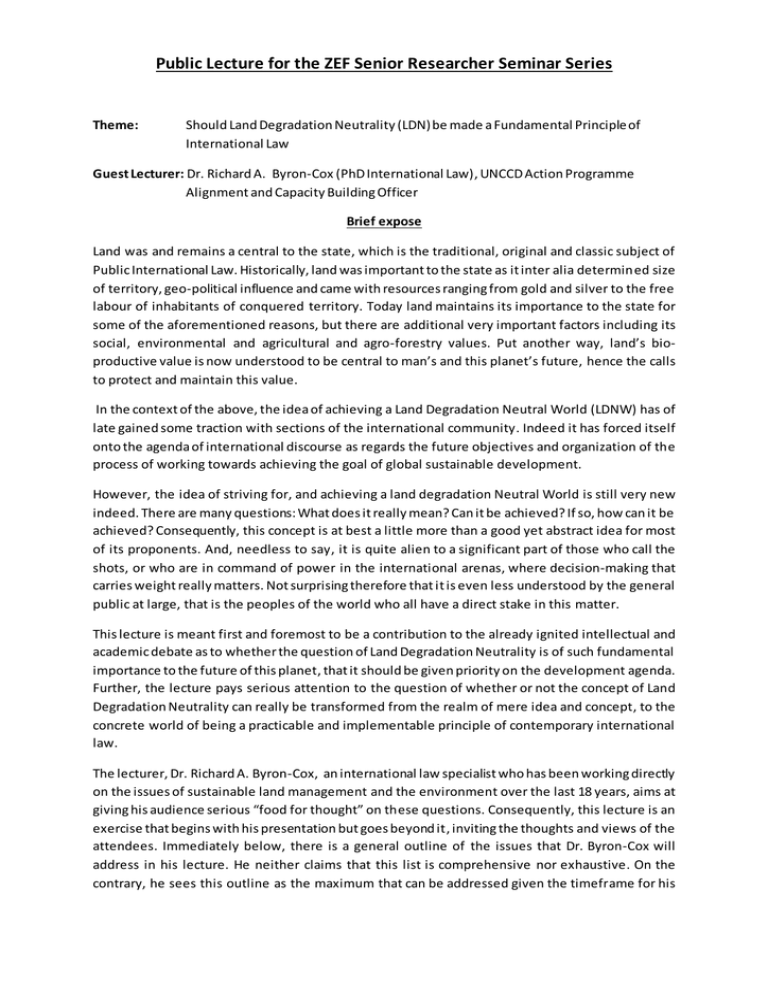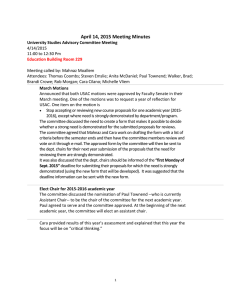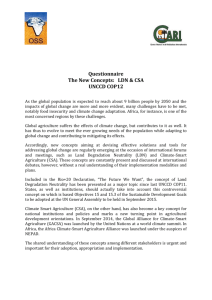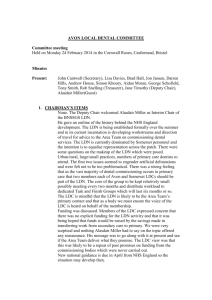Public Lecture for the ZEF Senior Researcher Seminar Series
advertisement

Public Lecture for the ZEF Senior Researcher Seminar Series Theme: Should Land Degradation Neutrality (LDN) be made a Fundamental Principle of International Law Guest Lecturer: Dr. Richard A. Byron-Cox (PhD International Law), UNCCD Action Programme Alignment and Capacity Building Officer Brief expose Land was and remains a central to the state, which is the traditional, original and classic subject of Public International Law. Historically, land was important to the state as it inter alia determined size of territory, geo-political influence and came with resources ranging from gold and silver to the free labour of inhabitants of conquered territory. Today land maintains its importance to the state for some of the aforementioned reasons, but there are additional very important factors including its social, environmental and agricultural and agro-forestry values. Put another way, land’s bioproductive value is now understood to be central to man’s and this planet’s future, hence the calls to protect and maintain this value. In the context of the above, the idea of achieving a Land Degradation Neutral World (LDNW) has of late gained some traction with sections of the international community. Indeed it has forced itself onto the agenda of international discourse as regards the future objectives and organization of the process of working towards achieving the goal of global sustainable development. However, the idea of striving for, and achieving a land degradation Neutral World is still very new indeed. There are many questions: What does it really mean? Can it be achieved? If so, how can it be achieved? Consequently, this concept is at best a little more than a good yet abstract idea for most of its proponents. And, needless to say, it is quite alien to a significant part of those who call the shots, or who are in command of power in the international arenas, where decision-making that carries weight really matters. Not surprising therefore that it is even less understood by the general public at large, that is the peoples of the world who all have a direct stake in this matter. This lecture is meant first and foremost to be a contribution to the already ignited intellectual and academic debate as to whether the question of Land Degradation Neutrality is of such fundamental importance to the future of this planet, that it should be given priority on the development agenda. Further, the lecture pays serious attention to the question of whether or not the concept of Land Degradation Neutrality can really be transformed from the realm of mere idea and concept, to the concrete world of being a practicable and implementable principle of contemporary international law. The lecturer, Dr. Richard A. Byron-Cox, an international law specialist who has been working directly on the issues of sustainable land management and the environment over the last 18 years, aims at giving his audience serious “food for thought” on these questions. Consequently, this lecture is an exercise that begins with his presentation but goes beyond it, inviting the thoughts and views of the attendees. Immediately below, there is a general outline of the issues that Dr. Byron-Cox will address in his lecture. He neither claims that this list is comprehensive nor exhaustive. On the contrary, he sees this outline as the maximum that can be addressed given the timeframe for his presentation. And, hopes that with your participation and contribution, meat will be added to the skeleton he provides. Finally, this exercise is really for all those who are concerned in one way or the other with the future of this planet irrespective of whether you are an intellectual, student or just a layman without any particular knowledge on this specific subject. The public is therefore invited to participate in something which the lecturer is convinced is not merely an intellectual or academic concern, but a fundamental issue that must be tackled if global sustainable development is to be achieved. Basic outline of the lecture General conceptual Framework 1. Understanding the term “land Degradation” a. What is land degradation b. The general importance addressing land degradation c. Natural & manmade degradation and their sometimes unseen linkage 2. The concept of land degradation neutrality (LDN) a. From whence (the history) the idea of LDN b. The challenge of defining what is LDN c. The present state of affairs concerning states’ relation to LDN Should and can the LDN concept become a global practice? 3. Does the world as a whole need to apply the concept of LDN? a. A brief view of our present global environment and the question of land b. The general aim of the post 2015 global development agenda c. LDN as a cardinal element in the quest for sustainable development d. Measuring LDN e. Can you implement something you can’t measure? International Law and the practice of LDN as a sovereign obligation 4. LDN as a principle of international law a. The general understanding of international law and its principles b. Can this concept be made a principle? c. Why LDN should be a principle of general, not merely international environmental law d. The legal feasibility of the application of such a principle Where do we go from here? 5. Is there an alternative to making LDN a principle of international law? a. Land is more than an environmental issue (oxygen, food, water, energy and mineral resources) b. Some of the possible consequences of inaction c. Land the never-ending international political issue d. Will treating the symptom cure the disease?




![Pre-workshop questionnaire for CEDRA Workshop [ ], [ ]](http://s2.studylib.net/store/data/010861335_1-6acdefcd9c672b666e2e207b48b7be0a-300x300.png)


